If you want to be notified of updates to this site there are two ways:
- RSS: this is part of most modern browsers (even Internet Explorer if you have version 7), the browser will automatically check for site updates and give you an excerpt and a link to the full post. The address should be automatically detected, you’ll see an orange icon in the address bar that you can click on to subscribe. For manual configuration the address is http://www.caboose.org.uk/feed/
- Mailing list: when I add some significant updates to the site I usually send an email to my kevinnigeria mailing list. To subscribe send an email to:
kevinnigeria-subscribe at caboose.org.uk
Don’t worry, you wont be bombarded with email, it’s usually one or two a month.
On the way to and from Ghana we passed through Lagos. I found it much less chaotic than its reputation had led me to expect. Maybe if it’s the first place you see in Nigeria it’s a bit overwhelming but to me it’s just like any Nigerian city but on a larger scale.
One odd experience was visiting the Palms shopping centre, which is packed full of very wealthy Nigerians. It has shops just like you’d see in Western Europe, including a supermarket. I thought it was interesting that a lot of the prices in the supermarket were actually lower than in ordinary Nigerian markets. Of course, the people who’d benefit most from these lower prices probably can’t afford transport to get to Palms and might not be allowed in even if they reached it.
Transport was easy, although Marebec and Dave had been there before and knew where to get buses to various parts of the city. We took one very scary okada in the night, weaving in and out of traffic at speed and hurtling over potholes. I wouldn’t mind if I had any confidence that the riders were in control of their bikes but they’re pretty poor, always either on full throttle or the brake, on sandy roads that means you keep sliding about.
The bridges are one of the distinctive features of Lagos, especially the Third Mainland Bridge. This is the one we took to the airport, it is (or was, not sure) the longest in Africa and is apparently deteriorating badly due to a total lack of maintenance. It’s quite strange to be in a bus, hurtling across a dual-carriageway concrete bridge and looking at stilt houses in the lagoon on one side.
Here is some general information we worked out or picked up as we travelled around Ghana. We used the Bradt Ghana guidebook (3rd edition, 2004) and I recommend it, it’s worth noting that prices for most things have approximately doubled since the guidebook was published.
(more…)
I brought a Flexifoil Sting 1.2 kite back to Nigeria with me in November (that’s a fairly small power kite, 1.2 square metres). I’ve not had much of a chance to fly it due to lack of wind or other things to do.
Today I finally had the time and the wind was strong enough, so I wandered over to the NTI Staff Primary school football pitch and unpacked the kite.
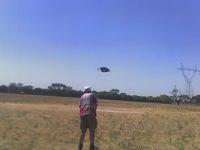
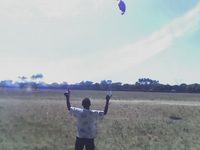
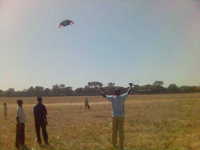 (more…)
(more…)
Just over a week ago I travelled to Ibadan with my colleague Niyi. We were doing some work at NTI’s South-West zonal office, installing some software we had written.
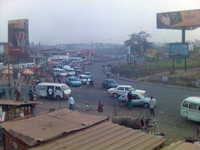
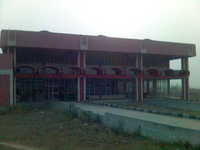
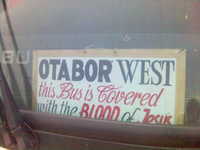
On the left is one of the major junctions and public transport hubs in Ibadan, I was staying in a guesthouse nearby. In the middle is the “Oyo State Luxurious Bus Terminal”, very grand but barely used, the buses just sit in the car park beside it. The picture on the right is of the sign at the front of my ABC Transport bus up to Abuja.
I’m beginning to think that somebody is spreading caltrops on the expressway in Ibadan, the ABC bus arrived with a fist-sized hole in one of its tyres. This is not the first time my bus has had a puncture in Ibadan.
I occasionally read naijablog, the blog of an English expat living in Abuja. Sometimes it reminds me how two people can live in the same place but see it in a different way.
For example Jeremy is quite fond of saying that the Hilton is Abuja’s city centre, maybe this is true if you’re an expat or an ultra-rich Nigerian. As I saw Abuja it had several smaller centres, spread across the different districts.
For example, for the part of town close to Radio House the centre was the square outside the Garki Area 7 Shopping Centre (UTC). During the day this was mostly a car park for the surrounding shopping complex, with a few small stalls selling videos and phone accessories on the road side. In the evening there were suya stalls and young people playing basketball, pool and table tennis. Sadly, last time I was in Abuja it was fenced off and something was being constructed on it, a loss of a useful public space.
Other districts have their own centres, although the demolitions in Abuja have damaged or destroyed many of them. Wuse Zone 4 had it’s collection of shops, restaurants and bars demolished last year but people still congregate in the area in the evening. Garki Area 2 has a small market and shops around its Shopping Complex.
It seems these centres were designed-in as part of Abuja’s master plan, each district having a “corner shop” or “shopping centre”. The current interpretation of the plan is that these should be (yet more) ugly shopping plazas rather than open, public spaces.
I don’t know the more upmarket parts of town (Wuse II, Maitama, Asokoro) very well but they too probably have some kind of “centre”, you just have to look around you and maybe sometimes walk rather than driving from place to place in air-conditioned isolation.
- Taxis are all clearly marked (by orange wings) in Ghana. While this theoretically applies in Nigeria most taxis in (for example) Abuja are unmarked.
- There seems to be some enforcement of car roadworthiness checks in Ghana, you don’t see the kind of old wrecks on the road that you do in Nigeria. Maybe the vehicle inspectors are less easily bribed in Ghana?
- Electricity. In Ghana you get a schedule telling you when there are going to be outages (due to insufficient supply), in Nigeria NEPA/PHCN like to keep it a surprise (probably even to themselves). The Ghanaians complain about how the suffer due to poor electricity supply anyway, I struggled not to laugh at them.
- Ghana still has an agricultural sector, the economy hasn’t been completely dominated by one product.
- Newspapers in Ghana actually contain some news, rather than stories the journalists have been bribed to insert.
- Ghanaians aren’t as keen on greetings, in fact often asking “how is your family?” or “how was the night?” will result in blank faces or funny looks.
- Ghana smells. The drains at the side of the road seem to commonly be used as sewers, in Nigeria they’re normally just storm drains. This gives the country a special aroma.
- The roads in Ghana are mostly in reasonable condition. I often travel on the Abuja-Kaduna expressway, Nigeria’s best road (because the generals used to use it to travel between the capital and their homes in Kaduna). A typical major road in Ghana is at least as good. Even dirt roads to villages in Ghana showed some signs of maintenance.
- There’s a greater variety of food in Ghana. Even in smaller towns you can often get some “continental” or even Chinese food. Ghanaians seem to be more adventurous when it comes to food.
- You get singled out for begging in Ghana. In Nigeria the beggars go round everyone, in Ghana they immediately target the rich “obruni” tourists. In fact in Nigeria you don’t feel as singled-out just for being white.
Of course this is based on the parts of Ghana I saw, it’s possible that things are different in the north. In general I’d say that things work better in Ghana but I found the people slightly less friendly.
We finally got back from Ghana on Sunday and then travelled up from Lagos to Abuja on Monday. The bus trip, using the Ekene Dili Chukwu bus, took a bit longer than expected due to a flat tyre as we left Lagos and then the spare going flat around Ibadan. We had to wait at Ibadan for two and a half hours until the first Abuja-Lagos bus passed by and left us their spare.
Around this time I saw an amusing story in the news, the Nigerian aviation minister condemning airlines for being rude to Nigerians. Obviously customer service (good or not) is a government issue but making sure that aircraft don’t keep falling out of the sky is not. I suspect he’s using this to distract attention from something else, such as his enormous incompetence, he’s not very specific about how the airlines are being rude.
I’d suggest that the airlines could do with being much stricter (although polite). On flights to Nigeria you see people staggering on board with ridiculous cabin baggage, several bags that are each larger than is allowed and certainly more than 10 kg.
We hadn’t realised that the second would be a public holiday in Accra, for Eid al-Adha. This meant that lots of places, including the restaurant at the guesthouse, were closed. We ended up having meat pies at a bar on the ring road.
After an afternoon of resting we heading down to Osu to find an Ethiopian restaurant mentioned in the guidebook. The directions to find it weren’t much use but a helpful woman pointed the way to it, unfortunately it’s no longer open.
We went into the Koala supermarket, famous among Ghana VSOs in the same way that Park’n’Shop is in Nigeria. The prices are mostly quite good compared with supermarkets in Nigeria. We wandered along “Oxford Street” and ended up eating at the Tip-Top Chinese restaurant. The food was good (although my octopus was very spicy) and the prices are OK.
(more…)
We turned up at the airport in Accra on Thursday, ready for our flight back to Nigeria. After having a look in duty-free and spending my last 10000 cedis on a can of coke we settled down in the departure gate lounge.
After a while there was an announcement that the flight from Lagos was delayed due to weather and that a new arrival time would be announced (which really meant that it hadn’t taken off yet). There was no mention of the effect that it would have on our flight, which would be using the same aircraft.
Eventually a Virgin Nigeria staff member appeared and I just managed to overhear her telling some other people that our flight was cancelled. She then retreated rapidly without telling us about it.
After lots of milling around (and shouting on the part of some stroppy Nigeria passengers) we got our tickets back and were told that we could have a refund or that we might be able to get a seat on the Friday evening flight. I left my number and then had to persuade security to let me into the baggage reclaim area so that I could change some money for a taxi back into town.
Yesterday we rebooked onto the Sunday morning flight, we’re hoping that the Harmattan reduces enough so that flights in and out of Lagos can resume. I got a call from Virgin Nigeria saying something about some seats on a flight at 9 o’clock but the line was very bad and we’d already rebooked.
So now we’re settled down at Sarah’s house hoping that our flight tomorrow morning won’t be cancelled.
We tried calling VSO to let them now that our travel plans had changed but nobody answered the landline and the 24 hour emergency line wasn’t working. In the end Dave had to call the personal mobile number of one of the staff and we’re still not sure if they’re actually going to let our employers know we’ll be late back.
![[Nigeria]](/media/Flags/NGflagSmall.png)





